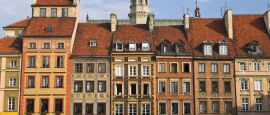Poland History, Language and Culture
History of Poland
The history of Poland begins in the Early Middle Ages with the migration of Slavs into the area, which by the 10th century had established a permanent settlement and founded the nascent Polish state. At its peak, it was one of the large nations in Europe, prospering under a commonwealth with Lithuania, but by the 18th century its territory had been reduced to little more than a buffer state between the three kingdoms of Austria, Prussia and Russia. Between 1772 and 1795, the country was carved up amongst the three countries and did not gain independence again until the end of WWI in 1918.
In 1926, a military regime under Józef Piłsudski ousted the civilian administration and governed Poland until the country was once again dismembered by its powerful neighbours, Germany and the Soviet Union, under the terms of their so-called Anti-Aggression Pact of 1939. Commitments by the UK to defend Polish sovereignty were ignored when Germany invaded Poland in September 1939, starting World War II.
In 1941, the Germans drove the Soviet army out of Poland and were themselves ejected four years later. At the end of World War II, the Soviet-backed Polish Workers' Party formed a coalition government under Władysław Gomułka, until he was dismissed in 1948. In the same year, the Polish Workers' Party merged with the Polish Socialist Party to form the Polish United Workers' Party (PZPR).
In 1956, Gomułka returned to power amidst growing unrest to implement a plan of gradual liberalisation of society and the economy. After disturbances in the industrial ports of Gdańsk, Gdynia and Szczecin in 1970, Gomułka was replaced as first secretary of the party by Edward Gierek.
In 1981, with the backing of Moscow, the former army chief of staff, General Wojciech Jaruzelski, replaced Kania and imposed martial law in response to the Solidarity labour movement, which was banned. The early 1980s saw a tense standoff between the state and the unions, which did not ease until the Gorbachev era.
In 1989, following the virtual collapse of the Polish economy and the falling of the Berlin Wall, the PZPR government opened genuine negotiations with Solidarity, which was legalised, paving the way for semi-free elections. In 1990, Solidarity's Wałesa became the first popularly elected president of Poland. Poland joined NATO in 1997 and the European Union in 2004.
Did you know?
• Poland was not a sovereign state from 1795 to 1918, but desire for a Polish nation burned fiercely unceasingly through the period.
• The Polish constitution was the first in Europe and the second in the world, after India.
• Roughly one third of Poles are thought to live abroad.
Language in Poland
Polish is the official language. There are a few small German-speaking communities primarily in the southwest. English and, increasingly less so, Russian are also spoken. French is also popular.
- Beer = Piwo
- Closed = Zamknięte
- Danger = Niebezpiecznie / Niebezpieczeństwo
- Do you speak English? = Czy pan mówi pan po angielsku? (to a man) / Czy pani mówi po angielsku? (to a woman)
- Doctor = Doktor
- Eight = Osiem
- Eighty = Osiemdziesiąt
- Entrance = Wejście
- Exit = Wyjście
- Fifty = Pięćdziesiąt
- Five = Pięć
- Forty = Czterdzieści
- Four = Cztery
- Friday = Piątek
- Goodbye = Do widzenia / Do zobaczenia
- Hello = Dzień dobry
- Hotel = Hotel
- How are you? = Jak się masz? (informal) / Jak się pan ma? (formal)
- How much does it cost? = Ile to kosztuje?
- I'm very well = Bardzo dobrze/W porządku
- I don't understand = Nie rozumiem
- I feel ill = Jestem chory (male) / chora (female)
- Menu = Jadłospis
- Monday = Poniedziałek
- My name is … = Nazywam się...
- Nine = Dziewięć
- Ninety = Dziewięćdziesiąt
- No = Nie
- One = Jeden
- One Hundred = Sto
- One Thousand = Tysiąc
- Open = Otwarte
- Please = Proszę
- Restaurant = Restauracja
- Saturday = Sobota
- Seven = Siedem
- Seventy = Siedemdziesiąt
- Six = Sześć
- Sixty = Sześćdziesiąt
- Sunday = Niedziela
- Ten = Dziesięć
- Thank you = Dziękuję
- Thirty = Trzydzieści
- Three = Trzy
- Thursday = Czwartek
- Today = Dziś / Dzisiaj
- Toilets = Toalety
- Tomorrow = Jutro
- Tuesday = Wtorek
- Twenty = Dwadzieścia
- Two = Dwa
- Wednesday = Środa
- Where is …? = Gdzie jest …?
- Wine = Wino
- Yes = Tak




 You know where
You know where